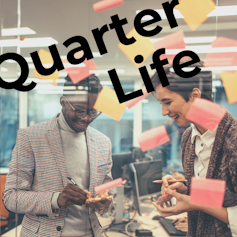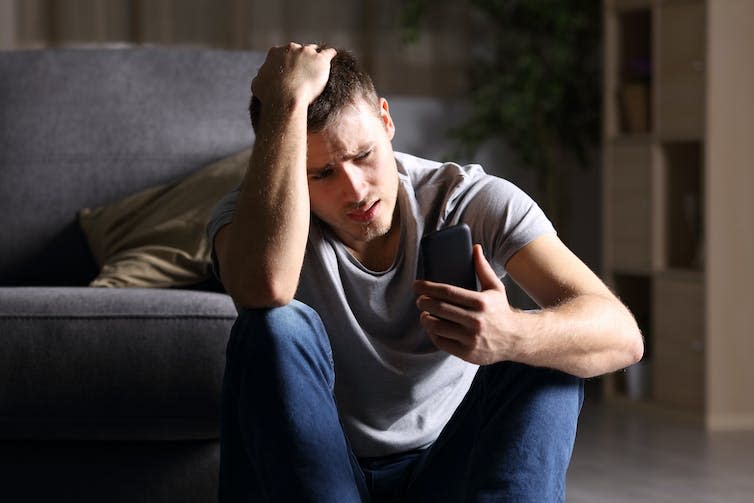Hundreds of millions of people worldwide use dating apps. But only half of users say they have had positive experiences. A shocking 11% of female users under the age of 50 have received threats of harm. There’s probably a better way to build these apps.
Dating sites and apps have made it easier to find sexual and romantic partners, expanding the pool of potential partners to encompass the entire Internet. About 10% of heterosexuals and 24% of LGB people have met their long-term partner online. But apps have also introduced (or modernized) many ethical issues associated with dating.
Before dating apps, many people met partners through family, friends or work, which meant potential partners were often ‘vetted’ by people we trusted. When you meet someone through an app, you often know nothing about them other than what they want to tell you. Making the pursuit of intimacy more private and individual has increased the likelihood of negative or harmful experiences.
Apps let you control how you present yourself and refine your dating pool using filters. Many see this as a useful and liberating tool to clarify their identity and meet like-minded people. There are even dating apps that are exclusive to people with certain political views.

This article is part of Quarter Life, a series about issues that concern us in our twenties and thirties. From the challenges of starting a career and looking after our mental health, to the excitement of starting a family, adopting a pet or simply making friends as an adult. The articles in this series explore the questions and provide answers as we navigate this turbulent period of life.
You may be interested in:
Valentine’s Day: Research-backed tips for dating app success
Online dating fatigue – why some people turn to face-to-face apps first
Love Island – what the show can teach young people about commitment
But the more critical you can be, the more you can contribute – often unconsciously – to unjust discrimination. Many people are wiped out or filtered out based on race, ability, class and appearance. For example, 99.8% of young black male sexual minority users have experienced some form of racial sexual discrimination. And only 3% of contacts initiated by white people are directed at black people. People with disabilities have reported receiving “insulting, pitying or aggressive comments,” or doubts about their ability to have sex.
Apps are carefully designed to keep your attention using elements and rewards that make using them feel like you’re playing a game. This can distance your behavior from your values. Maybe you need a few caring and nuanced interactions, or romantic love, but are turned on by notifications, or drawn into countless sporadic conversations in ways that you find alienating. Ghosting – suddenly leaving an interaction without explanation – is arguably disrespectful, but it can seem logical when apps lead you into conversations that go nowhere or lead to harassment.
In fact, using apps is turning into an activity in itself, making it less of a way to meet people and more of a source of attention, validation, and sexual intrigue in your pocket.
Finally, dating apps encourage users to objectify each other by making quick judgments based on appearance. From quick swipes with little information beyond a photo on apps like Tinder, to Grindr’s grid of torsos, dating apps make it easy to ignore with a glance.
Can dating apps be better?
We are love and relationship researchers who have studied online dating, the idea of compatibility, the nature of non-monogamy in love, and the needs of sexual minority groups.
Our continued exploration of these topics has convinced us that the people who design dating apps could do more to improve the experience for users. This is why at the Center for Love, Sex, and Relationships at the University of Leeds we are also launching a new research project on ethical online dating to explore how apps can become a better experience for everyone.


Some apps have already started doing this. Bumble only allows women to make the first move and has added a feature that automatically blurs nude photos, giving users the choice of whether they want to see the photo or not. Tinder has added new safety features, such as an AI that detects if a message contains offensive or sexually explicit language and prompts users to think twice before sending the message.
But they could go even further. Improved safety features can help people report harassment. Apps could do more to inform users when someone is using AI in their interactions, or make it easier to get feedback from friends, family, or other users. These improvements can make it less likely that users will encounter dangerous people.
Dating apps can give users more information about their preferences and behavior. Sporadic statistical overviews, or “year-end overviews” a la Spotify, can help users see whether they are as open-minded as they want to be, or simply pick people from similar racial or class backgrounds.
Finally, apps can “nudge” users toward more ethical behavior, for example by encouraging them not to ghost someone, or by imposing a cooling-off period for serial swipers.
While this may feel intrusive, keep in mind that dating apps already do this, for example by sending notifications encouraging you to check the app regularly.
Be a better dating app user
There are also steps you can take to communicate more ethically on dating apps. Being more aware of your own biases is a good start. That includes trying to be more open to people who don’t conform to what you think you want in a partner (especially when these preferences can be influenced by biases and stereotypes).
You can also pay more attention to what you say and do in apps. For example, avoiding ghosting others unless it is in response to abusive behavior. In short, remember that online dating isn’t just a game, even if it feels like it, and that the images on your phone are – usually – of real people.
This article is republished from The Conversation under a Creative Commons license. Read the original article.


The authors do not work for, consult with, own shares in, or receive funding from any company or organization that would benefit from this article, and have disclosed no relevant affiliations beyond their academic appointment.